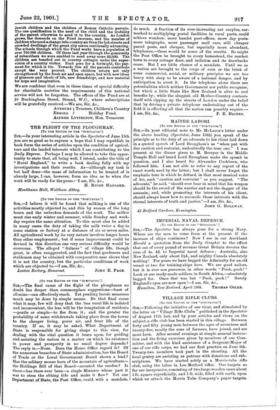[TO THE EDITOR OF THE " SPECTATOR:] Si,—The final cause
of the flight of the ploughman no doubt lies deeper than commonplace suggestions—least of all mine—can effectively reach. Yet pending heroic measures much may be done by simple means. Be that final cause what it may, few will deny that the less rural life is isolated and inconvenient, the less will be the temptation of residents —gentle or simple—to flee from it ; and the greater the probability of some withdrawals taking place from the towns to the cheaper living, purer air, and freer life of the countfy. If so, it may be asked, What Department of State is responsible for giving shape to this view, for dealing with the vital question it bears upon, for guiding and assisting the nation in a matter on which its existence in power and prosperity in no small degree depends ? The reply is,—None. Does the Home Office regard it? Of the numerous branches of State administration, has the Board of Trade or the Local Government Board shown a lead ? Has the solitary mouse born of the mountain of agriculture— the Holdings Bill of that Board—arrested the exodus ? Is there—has there ever been—a single Minister whose part it was to stem the ebbing tide and make it flow ? Yet one Department of State, the Post Office, could. with a mandate, do much. A fraction of its ever-increasing net surplus, ear- marked to multiplying postal facilities in rural parts, could achieve wonders : more hamlet post-offices, more day posts, more telegraphs, more passenger mail cars, still cheaper parcel posts, and cheaper, but especially more abundant, telephones,—these would be some of the results. So might the Post Office be brought to every homestead, the market town to every cottage door, and isolation and its drawbacks cease. But I see little chance of a mandate. Until we as a nation are brought to the verge of ruin or the brink of some commercial, social, or military precipice we are too heavy with sleep to be aware of a national danger, and by anticipation to avert it. In the telephone alone there are potentialities which neither Government nor public recognise, but which a little State like New Zealand is alive to and benefits by; while the sluggish old Mother-Country contents itself with ripping up the streets of London under the belief that by driving a private telephone undertaking out of the field it is effecting all that the nation can possibly require.—










































 Previous page
Previous page